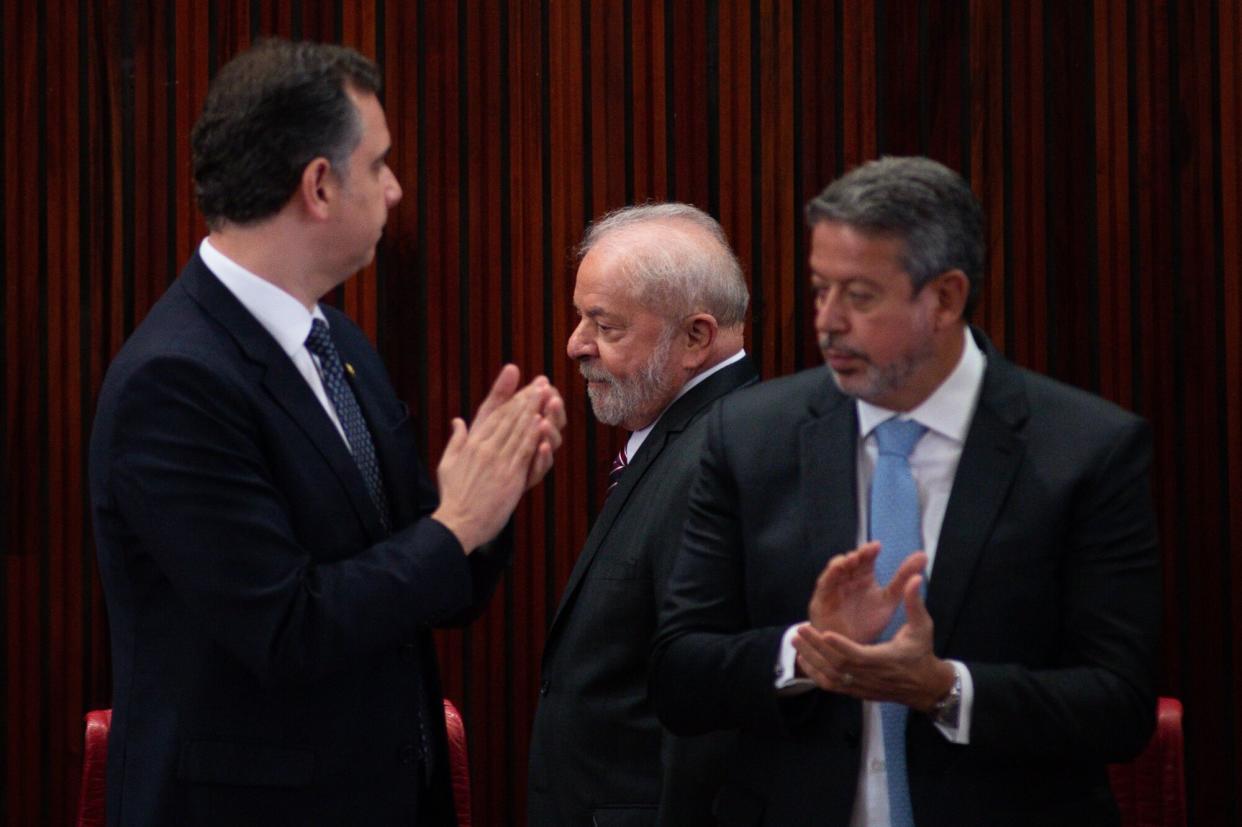Lula Struggles to Build Base in Congress 100 Days Into His Term

(Bloomberg) -- One hundred days into his presidency, Brazil’s Luiz Inacio Lula da Silva is still struggling to build a reliable base of congressional support he needs to steer key proposals through the country’s legislature.
Most Read from Bloomberg
US Core Inflation Slows Only a Bit, Keeping Fed on Track to Hike
Katie Cotton, Guardian of the Apple Brand for 18 Years, Dies
Inflation Data Will Shatter the Stock Market Calm, Goldman Partner Warns
A handful of opposition leaders and even those who have aligned themselves with Lula say the leftist president can count on about 200 loyal votes of a total of 513 in the lower house, leaving him well short of a majority needed to approve simple matters and far from the 308 votes he would need for key reforms that alter the constitution.
Lack of a solid congressional base threatens everything from the structure of Lula’s government, including the creation of new ministries, to his very ability to govern and deliver on campaign promises, said the people, who requested anonymity to discuss the situation.
Read More: Faltering Economy Endangers Lula’s ‘Barbecue and Beer’ Promise
Brazil’s fractured congress, which includes lawmakers from nearly two dozen parties, poses significant challenges to most presidents. But Lula’s situation is complicated by the fact that former President Jair Bolsonaro’s party won the largest share of seats in the lower house and pledged to turn congress into a bastion of resistance to the new government.
José Guimarães, the leader of the government coalition in the lower house, downplayed concerns about the lack of support. But he also declined to give an estimate on how many reliable allies the president currently has in the chamber.
“I’ll tell you only when there is a vote,” he said.
Lula’s struggles have surprised both analysts and lawmakers, who say a leader who proved skillful at navigating congress during his first two terms from 2003 to 2010, has this time been slow to dole out the federal funds and influential ministerial positions that often help Brazilian presidents build successful governing coalitions.
“The government has held back nominations at the second and third levels of the administration, which is already starting to generate noise in its relationship with congress,” said Júnia Gama, senior political analyst at XP Inc. “Complaints from lawmakers have been growing and the message is that, if it doesn’t improve, the government could face defeats.”
Ongoing Efforts
Lower house Speaker Arthur Lira sounded similar alarms in early March, warning that Lula “still doesn’t have a consistent base.”
Lula has so far appointed lawmakers from just eight of the lower chamber’s 23 parties to lead ministries, even though he has already nominated nearly 20 party members for roles in the government. Alexandre Padilha, who as the minister of institutional relations oversees the administration’s dealings with congress, has since pledged to redouble efforts to build support in the legislature.
“We’ll keep talking with the 17 parties that have already tapped names for the government, and with those that haven’t nominated but are open to dialog,” Padilha said in an audio message.
Late in March, Padilha said on Twitter that the government would soon release 3 billion reais ($573 million) for lawmakers to send to allied mayors, a move that could help consolidate congressional backing.
(Tweet translation: Watch out for the spoiler: we are going to release 3 billion reais in funds from parliamentary amendments to help rebuild around 3,000 Brazilian municipalities. These resources will help in the resumption of works and in the implementation of several projects throughout the country.)
Some parties, however, have already indicated that Lula’s efforts to woo them won’t necessarily translate into votes. União Brasil, a center-right party that holds 59 seats in the lower house, remains divided even after Lula handed three ministerial positions to its members.
“The appointment of ministers wasn’t backed by the party’s elected lawmakers,” congressman Mendonça Filho, a União Brasil member, said in an interview. “So there isn’t much of a commitment.”
Key Measures in Limbo
Lula has also been forced to manage a burgeoning crisis between Lira and Senate President Rodrigo Pacheco in recent weeks, as the two leaders spar over provisional measures waiting for votes in congress. Under Brazilian law, provisional orders from the executive branch must receive congressional approval within 120 days to remain in effect.
Among such measures is one that created new cabinet-level bodies, like Brazil’s first Ministry of Indigenous Affairs, and re-established others had Bolsonaro shuttered. It is set to expire in early May, a scenario that could throw the government into turmoil.
Congress will soon weigh a new fiscal package that is crucial to balance social spending plans with concerns about rising debt levels. An attempt to overhaul Brazil’s tax system will also requires delicate negotiations in the legislature.
Even if those measures end up approved without a traditional governing coalition, given that elements of both proposals have backers across the political spectrum, more ambitious plans may face a problem. Those include changes to the sanitation law, as well as the votes needed to protect the government from Bolsonaro-aligned lawmakers who may be eager to pounce on any failure.
Most Read from Bloomberg Businessweek
IRS Vets Reveal What’s Broken at America’s Most Hated Agency
A Runner’s Murder in Kenya Opens a Window Into Violence Against Women
What to Do With Your Money—and Your Life—in a Wild New World
©2023 Bloomberg L.P.



